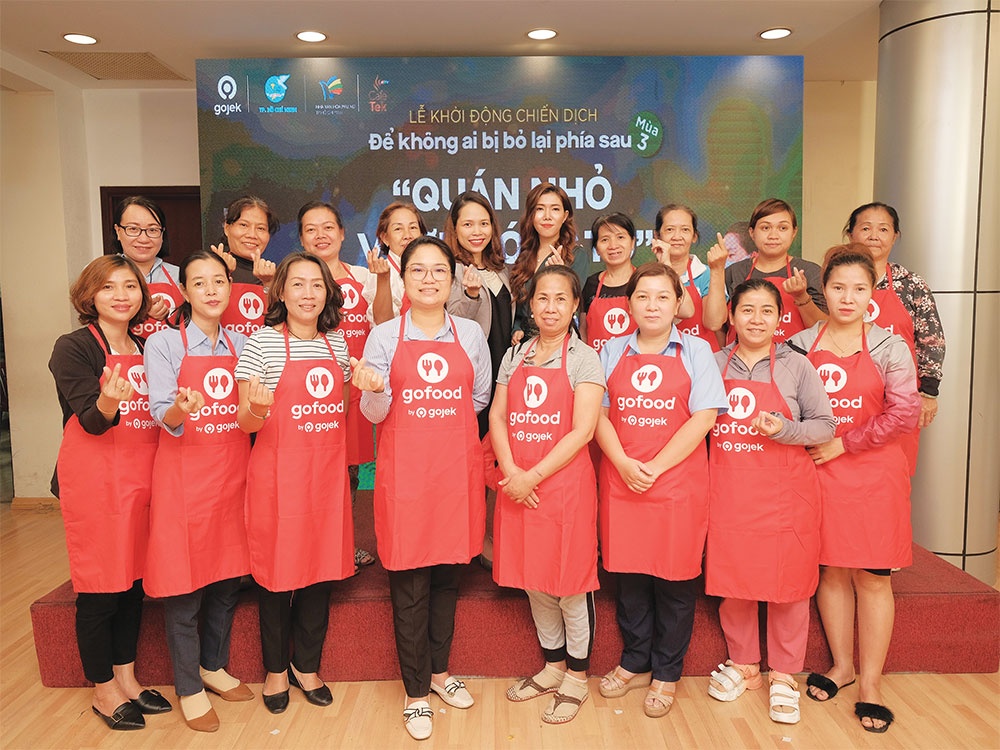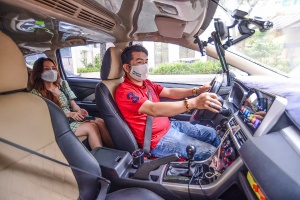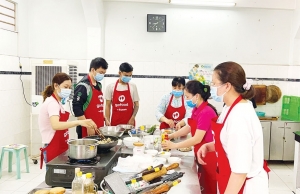Gojek just the ticket for struggling shopkeepers
 |
| Gojek offers training as well as digital and financial tools |
With a ramshackle beverage and snack cart located in Tan Binh district in Ho Chi Minh City, 55-year-old Le Thi Yen is the breadwinner of her 5-member family. The vendor’s eldest son has his own family but the couple, who used to engage in the tourism sector, have been unemployed since the pandemic peak. Meanwhile, Yen’s youngest son has just entered a university, financially burdening the woman.
Yen said her business comes largely from the purchase of students and workers who are limited in spending. In the past, she had a fairly stable business. However, keeping it this way was becoming increasingly difficult.
“The pandemic greatly dented the pockets of everyone, making it harder for us to maintain the business,” Yen said. “All spending has depended on me but my income remains unstable due to limited sales. If I’m lucky enough, my sales could be about VND1-2 million ($45-90) a day, but the profit is meagre after input costs are excluded. I have lost sleep for many months.”
Realising that the business was no longer the same as before, and with her health condition also going down, Yen several times thought about online business to expand the customer network, and lessen the time of running back and forth delivering drinks to customers.
However, because she did not know much about the technology and how to operate an online food shop, she was afraid to go digital. Moreover, her sons also did not want her to do so, for fear that she may get deceived.
In another case, the family restaurant of 62-year-old Le Thi Kim Anh also faced a similar plight. Her family set up a counter and chairs in front of her house in Phu Nhuan district in Ho Chi Minh City, selling traditional Vietnamese dishes such as vermicelli and noodles with different daily menus.
Although she has been in business for a long time, Anh has always operated the restaurant in the traditional way, serving dine-in guests only. She prepares food and her daughter helps serve the guests, tidy up, and collect the money.
Anh said that during the pandemic peak, her family had to close the shop temporarily, thus meaning great losses of income. Things became even more difficult when the restaurant was reopened but people did not come as expected. Her sales were going down drastically.
Like Yen’s case, Anh and her daughter were afraid to move to an online platform as they had no knowledge about product pricing and how to run business effectively on the apps.
“We completely don’t know how the apps operate and how they can benefit us. I’m also quite old, and we have only ever used a phone when it comes to communication,” she said. “I did try the online food delivery service and found it was very convenient, but when I came up with the idea of signing up to become a merchant of the apps, I didn’t know where to start.”
In order to empower and upskill female entrepreneurs to leverage e-commerce to access new income-earning opportunities and help reduce barriers to socioeconomic growth, in November 2022, Gojek cooperated with the Ho Chi Minh City Women’s Union to organise a business skills training course for 200 female micro-merchants, focusing on the topics of financial planning, business management, and how to run an online shop.
This is part of the project titled “Small shops weather big storms”, which is an inclusive initiative launched in 2022 by Gojek to help micro-entrepreneurs improve their livelihoods by going digital. Joining the course, Yen, Anh, and many other food stores’ owners have been provided with new knowledge, and have gained more confidence to put their products up for sale online.
“After the training, I realised that my way of running business before was inefficient. This course has helped me know how to take notes and keep track of the business in a methodical and systematic way so that I can manage profits and losses,” Yen said.
Besides the training, Gojek has also built an online repository of digital and financial tools, which will help tens of thousands of micro-merchants in Vietnam to successfully set up and run a small food business online.
Following the completion of the training series, female entrepreneurs can start their own food business on GoFood, Gojek’s online food delivery platform, and reach millions of consumers who are transacting on the Gojek app. In addition, Gojek will support these merchants, helping them to accelerate their online business journey through personalised onboarding assistance and exclusive marketing campaigns, as well as favorable incentives.
A Gojek representative shared, “We have helped tens of thousands of merchants, 90 per cent of which are medium-, small- and micro-ones, to grow their business online. We hope that our efforts to will help them to build more resilient businesses and, in turn, contribute to the resilience of our economy.”
 | Gojek shakes hands with MoMo Gojek and MoMo have announced a strategic partnership, integrating the latter’s wallet on the Gojek app in Vietnam. |
 | Gojek launches GoCar XL Protect 7-seater ride-hailing service To further honour its commitment to health and safety, Gojek Vietnam announced the launch of GoCar XL Protect, its new 7-seater ride-hailing service, in Ho Chi Minh City and Hanoi on May 4. |
 | Gojek Vietnam leveraging tech to remove life’s frictions Mobile on-demand platform Gojek has been growing from strength to strength since its inception in Vietnam in 2018, proving its strong position as a growth partner for drivers and merchants. |
 | Gojek launches new campaign to support digitalisation for micro-entrepreneurs Gojek, Southeast Asia’s leading on-demand platform, launched the Small Shops Weather Big Storms campaign in Vietnam on November 1, an inclusive initiative to help micro-entrepreneurs improve their livelihoods by going digital. |
 | Gojek appoints new leader in Vietnam Gojek, Southeast Asia’s leading on-demand mobile platform, on January 18 announced that Sumit Rathor had been appointed as its general manager. |
What the stars mean:
★ Poor ★ ★ Promising ★★★ Good ★★★★ Very good ★★★★★ Exceptional
Related Contents
Latest News
More News
- Vietnam sets ambitious dairy growth targets (February 24, 2026 | 18:00)
- Masan Consumer names new deputy CEO to drive foods and beverages growth (February 23, 2026 | 20:52)
- Myriad risks ahead, but ones Vietnam can confront (February 20, 2026 | 15:02)
- Vietnam making the leap into AI and semiconductors (February 20, 2026 | 09:37)
- Funding must be activated for semiconductor success (February 20, 2026 | 09:20)
- Resilience as new benchmark for smarter infrastructure (February 19, 2026 | 20:35)
- A golden time to shine within ASEAN (February 19, 2026 | 20:22)
- Vietnam’s pivotal year for advancing sustainability (February 19, 2026 | 08:44)
- Strengthening the core role of industry and trade (February 19, 2026 | 08:35)
- Future orientations for healthcare improvements (February 19, 2026 | 08:29)

 Tag:
Tag:




















 Mobile Version
Mobile Version